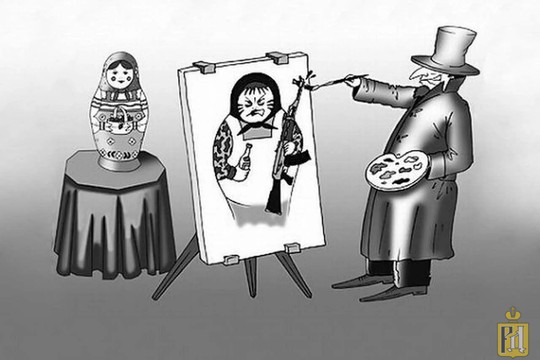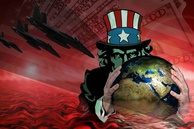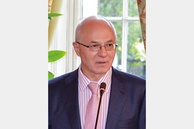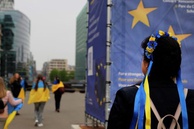Why is there still ill-feeling and even hatred towards Russia in Europe? Why hasn’t it disappeared? Why is it that for years, decades, centuries after, the European phenomenon known as “Russophobia”, or enmity towards Russians, has been here to stay and is as felt as ever?
The impression is that Russophobia is part and parcel of the European mindset, that it is handed over from generation to generation. That Russophobia is strongly making itself felt in Europe yet again testifies to the fact that Europe is facing a new crisis, which the Europeans are trying to turn into a smear campaign against Russia. Europe puts the blame for all its troubles on Russia, without any intention of acknowledging its own mistakes.
These anti-Russian sentiments are deeply rooted in the past.
Here is a document titled “The First Political Will” which was written by King of Prussia Friederich the Great in 1752: “For deterring Russia, Prussia needs to fortify the eastern border, needs sufficient influence on Poland in order to have a tangible defensive stronghold on Vistula….Prussia would benefit most from a civil war in Russia and lack of unity in Russia. A strong Sweden, a strong Scandinavian counter-balance to Russia in the Baltic, plays into Prussia’s hand too…»
In 1578, Count of Alsace thought of “a plan to transform Moscovia into an imperial province”. The Count’s assistant Henrich Staden wrote: “The new imperial province Russia will be ruled by one of the emperor’s brothers. The power in the captured lands must belong to imperial representatives, whose objective will be to provide German troops with everything needed at the expense of the population. To this end, each military camp should have peasants and tradespeople assigned to it – on a territory of twenty miles – so that they will pay maintenance to our warriors for their safety and provide our forces with everything needed…. We must take away from Russians their best horses, and their best riverboats…”
In 16th-19th centuries Europe saw a large number of publications of Russophobic books, which created an anti-Russian public opinion. Among those were “The Notes on Muscovite Affairs of 1517” by Sigismund Herberstein; “The Country and Rule of Muscovites” by Henrich Staden, 1576; “The Secret Notes on Russia of the Reign of Catherine II and Paul I” by Charles Masson, 1801; “The Notes on Russia” by Baroness Germaine de Stael, 1812, and others in which the European authors portray Russians as “white barbarians”, “slaves by spirit” and “aggressors”.
Undisguised Russophobia became particularly pronounced in Europe when Russia, having defeated Napoleon, became a major military power – it happened during the rule of Emperor Nicholas I (1825–1855). It was then that Marquis de Custine published his book “La Russe en 1839”, which marked an important stage in the information and propaganda war run by Europe against Russia. The Russophobic book became a European model for assessing Russia and the entire Russian nation. Even though de Custine received a hearty welcome in Russia and became a guest to Emperor Nicolas I, the final version of his book revealed a lot of false information on Russia. Although the publication was presented to the European reader as “documentary notes”, it contained a large number of untrue stories and their interpretations.
De Custine wrote: “ Those who were unfortunate to have been born in this country have all but to seek consolation in dreams of global supremacy…”. The author thereby hinted at the inherent aggressiveness of the Russians. It is as if he referred to his native France under Napoleon, dreaming of global supremacy. Judging by historical facts, it was none other than the Europeans who were the first to set up concentration camps in South Africa – in Transvaal and the Orange Republic (the English), to build furnaces for extermination of people in Buchenwald and Auschwitz (Germans), to create colonialism (the English and the French were the first, followed by the rest of West European countries – Holland, Italy, Belgium…), to use guns for the execution of people (the English executed mutinous sepoys in India). Fascism, Russophobia and Holocaust – these are European not Russian, inventions!
“Russophobia has deep historical roots”, - Swiss publicist and publisher Guy Mettan told a press conference in Moscow several years ago, having presented his book, which was translated into Russian as “The West-Russia: Thousand-year war. The History of Russophobia from Carl the Great to the Ukrainian Crisis”. Guy Mettan believes that Russophobia is “the historically conditioned peculiarity of the European mentality”. Notably, this definition was suggested by a European writer, who knows the European mentality perfectly well…
Now, after a bit of history, we will try to explain where Russophobia takes root from.
From my point of view, there are four ideological components that form the basis of Russophobia – historical and political, nature and resource, cultural and spatial.
The historical and political component shows that Russia has never, throughout centuries, surrendered to Europe after direct aggression from the West. The Russian army has more than once defeated united European forces, winding up military campaigns in aggressor capitals. Europe, even though subconsciously, cannot forgive Russia the multiple humiliation it experienced after its historical defeats. The most glamourous of Russia’s Victories were the Victory over Napoleon and Hitler, either of whom amassed huge armies consisting of soldiers from dozens of European countries for “the campaign on the East”. All those interventions were crushed by Russian troops!
The second component is nature and resource, since huge natural resources of Russia trigger envy and a wish to assume control of them. The fact that Europe cannot boast substantial natural resources became the reason for European colonial wars. All this “belongs to the entire humanity”, former US Secretary of State Madeleine Albright said once. «The Economist» editor Edward Lucas too has publicly expressed the old pain of Anglo-Saxons, who feel deprived of the gifts of Nature on their island. He said that the economy of Russia hinges upon the underserved (!) income from the production and sale of natural resources.
One more component of this phenomenon is the cultural one. Karl Marx, the founding father of Communism, said once: “The true Muscovites, that is, residents of the Grand Duchy of Muscovy, are mostly Mongols or Finns…I want this view to become dominant among the Slavs…”. The attempts to change the “cultural code” of both Russians and other peoples of Russia were repeatedly made by the West in the past centuries and continue to be made now. The West is pursuing a plan – to subdue our vast country to serve western interests through imposing western culture in place of the culture of Russian peoples. At present, it is known as “mass culture”, which is coming from the West. The essence of such a strategy is to re-cultivate the population of Russia in western style so that it will be easier to control it. In the 1990s, after the collapse of the USSR, this program was in part implemented, and the West received an opportunity to collect the Russian riches worth 3 trillion dollars in the prices of 1990. In return the Russian people were offered “mass culture” for entertainment. The West also tried to raise the Russian elite in the spirit of worshipping “western values”. Some of the goals were fulfilled. But in the end, all the attempts to fly European ideological colors over Russia failed. Openly frustrated over this fiasco, the West is trying to offset it through military revenge!
And finally, the fourth component of Russophobia is the spatial one. It boils down to the fact that residents of Europe, right from childhood, as they study the world map, can detect a vast country that literally hovers over the European peninsula of Eurasia. A correspondent from Denmark, whom I met at an international conference, explained to me why Europeans are so phobic of Russia: “Just look at the map – you are so big, and we are so small”. Thus, Russophobia is also about a constant fear, which is cultivated among Europeans and impresses the European imagination from early years. Emperor Alexander III said: “They are afraid of our vastness….” Even if they are, so what? Do we have to hand out our territories because of that?
Europe ought to accept the following as historical reality:
Russia will not give away its vast expanses. Europeans attempted to make it do so many times – they joined forces for military campaigns on Russia, but to no avail.
Russia will not give away its natural resources – we are ready to share them with Europe and the rest of the world on equal economic conditions, but not under the pressure of sanctions.
Europe will not be able to “kill the Soul” of Russia and transform Russians into “a chewing herd”, into “qualified consumers”.
We need to acknowledge that Russia has borrowed a lot from European knowledge, skills and experience to its advantage. De Custine, who wrote a pasquil on Russia, made a mistake when he “forgot” to inform his European readers that Peter the First began to invite to Russia European masters of different trades – from officers to shipbuilders, from architects to scientists, so that they would help in the preparation of our masters. Those Europeans who came to live on the Russian land and meant peace, became genuine patriots – they fought on the side of Russia and assisted in the development of the Russian state for centures.
Russophobes can’t understand that Russia is not only Country and State. Russia is Civilization. The civilization gene provides the strongest pillar to ensure that People and Country do not crack under pressure, including European, and that they proceed further and further along the Path meant for them.
read more in our Telegram-channel https://t.me/The_International_Affairs

 12:07 15.02.2024 •
12:07 15.02.2024 •



























